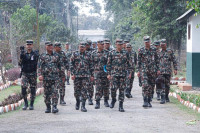National
Citizenship bill eases process, but gender bias remains
Experts say the revision still ties a child’s citizenship to the father’s identity, not the mother’s.
Post Report
After the House of Representatives last month passed the citizenship bill (second amendment to the Nepal Citizenship Act, 2006), it was hailed on social media as a big victory for gender equality.
While online discussions and forums celebrated the bill as making citizenship through mothers as being “equal to citizenship through fathers,” experts say this narrative is misleading.
Though the amendment eases some administrative hurdles, it still falls short of granting parents equal legal standing in conferring citizenship.
Experts say that while the bill resolves some procedural issues, it fails to give mothers the same legal authority as fathers in passing on citizenship. They warn that the law retains discriminatory provisions and reinforces a patriarchal system.
Sabin Shrestha, executive director of FWLD (Forum for Women, Law and Development), says the addition to Section 5 of the Act aims to resolve some practical problems that arise when conferring citizenship through a mother.
This section redefines what it means for a father to be “unidentified.” A child and their mother can jointly declare the father as unidentified if his identity is otherwise unavailable and he is out of contact, even if his name is recorded on the child’s birth certificate or educational records.
“The way people are celebrating this on social media, saying ‘this is a new and huge legal reform’, is misleading,” says Neha Gurung, a human rights lawyer and co-founder of the Citizenship Affected People’s Network. “There is nothing new. It simply clarifies what the Constitution already provides.”
Article 11(5) of Nepal’s Constitution states that children born to Nepali mothers may be granted citizenship by descent if the father is ‘unidentified’.
Shrestha explains that in past cases, even when mothers made self-declarations about the father being unidentified, officials denied citizenship if the father’s name appeared on the child’s birth certificate or documents.
“The new amendment clarifies this long-standing misinterpretation by officials, and that’s certainly a step forward,” Shrestha adds.
However, Gurung points out that the bill still falls short of the Supreme Court’s broader interpretation, which includes not just the absence of contact but also emotional neglect and lack of paternal responsibility.
“The current addition considers only the father’s name, ignoring other elements like the use of the surname, the father’s address in records, or whether the father was ever emotionally or physically present,” Gurung adds.
Another core issue is with the provision of self-declaration.
If the father’s identity is unknown, the mother must submit a formal self-declaration.
Shrestha points out that this process is stigmatising. On the ground, he says, there have been multiple cases where officials mock mothers, asking, “You have two children, and yet you don’t even know who the father of one is?”
Shrestha considers this process a direct attack on a woman’s dignity.
Moreover, the consequences are severe if this declaration is later challenged.
According to Section 21(3a) of the original Act, any action based on a false declaration may result in imprisonment for up to three years, and the citizenship obtained through such means shall be automatically revoked.
The current bill retains this clause.
“A father can secure citizenship for a child without ever being questioned about the child’s mother… her details are never sought,” Gurung points out.
But when it is the mother seeking citizenship for her child, she must provide full details about the father, whether he is Nepali, foreigner, or absent, and navigate the burdensome process of self-declaration.
If the mother’s statement is deemed false, she faces legal consequences. No such penalty exists for fathers.
“If this clause stays, it doesn’t just discriminate but criminalises motherhood,” Shrestha says.
Contrary to the social media buzz, Gurung says the bill does not provide full equality. “A bill or any law must follow the constitution, so when the constitution itself is discriminatory, how can a bill suddenly be fully just?”
The constitution, she says, uses gendered terms like ‘Nepali man’ and ‘foreign woman’ instead of just ‘Nepali citizen’.
If it used gender-neutral language, children could get citizenship more easily, whether through their mother or father. But since it mentions ‘Nepali mother,’ the patriarchal law and authorities still demand information about the father.
If the father is Nepali, the child gets citizenship by descent. If he is a foreigner, the child gets naturalised. As per another provision, only if the father is proven ‘unidentified’ can a woman confer citizenship by descent on her children.
“They claim it’s citizenship through the mother—but is it, really?” Gurung questions.
“If it truly were through the mother, why does everything still hinge on the father’s identity? Why is the mother questioned about her husband’s whereabouts and details before a decision is made? The category of citizenship, too, depends not on the mother but on whether the father is Nepali, foreign, or unidentified.”
“The law may mention mothers, but its spine is still patriarchal,” she adds. “The promise of equal citizenship through mothers is still an illusion, and the process is not as easy or authoritative in the case of citizenship through fathers.”
Shrestha agrees.
He also warns that even if the bill passes with the recommended changes, there could be hurdles in implementation.
“Officials at District Administration Offices act on patriarchal biases,” he says. “They reject valid citizenship applications by doubting mothers or making the process unnecessarily difficult.”
So, experts stress that once the bill becomes law, the Home Ministry must issue a clear circular to all 77 districts to ensure fair and consistent implementation.
The ultimate solution for full equality in citizenship through both parents, Gurung says, is a constitutional amendment, followed by necessary changes to all related laws based on that amendment, and their proper implementation at the local level.
For now, Shrestha urges the National Assembly to amend the punishment clause related to self-declaration. “There’s still time for the National Assembly to act,” he says. “Penalising Nepali mothers in this way violates both legal fairness and basic human dignity.”
Numraj Khanal Sharma, undersecretary at the National Assembly, explained that when the assembly receives the bill, it will undergo extensive discussions focusing on its content and the changes endorsed by the House of Representatives. If there are any amendments during this process, the bill must be re-endorsed by the House of Representatives.
“I agree that the bill addresses some administrative bottlenecks and marks progress, but the Home Ministry’s hype portraying it as a major victory is exaggerated,” Gurung says.
“They haven’t recognised or delivered true equality, yet they glorify half-measures as if they’re full progress,” she adds. “ This misrepresentation is dangerous; ministers must properly reflect on this sensitive issue.”




 8.26°C Kathmandu
8.26°C Kathmandu













